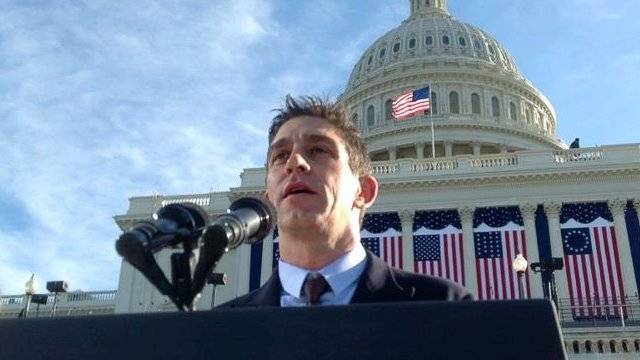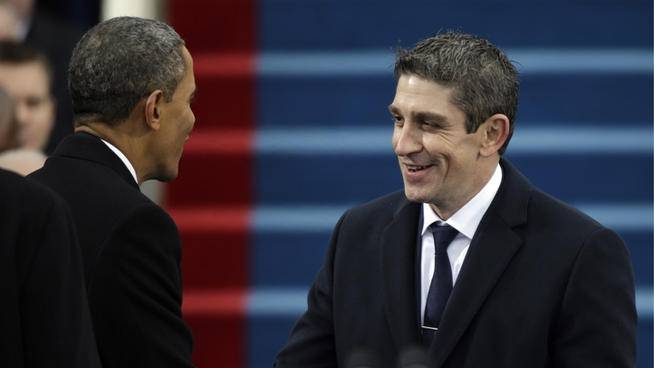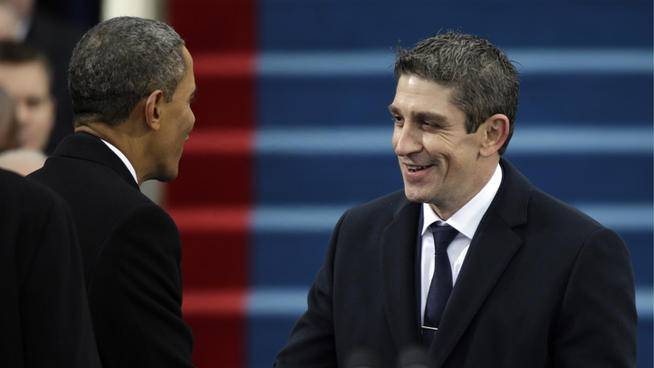
Richard Blanco paid a visit to Champaign-Urbana last week. If his name sounds familiar, perhaps it’s because he is a respected author, poet, public speaker, and the first openly gay Latino to read at a presidential inauguration. I had the privilege of attending a lunch with Blanco hosted by La Casa Cultural Latina, U of I’s Latino cultural house.
Sweet meatballs, brown rice, fried plantains, and spicy macaroni accompanied a conversation about Blanco’s past and the future of American literature. The event was attended by about 20 University of Illinois students, many of whom identified as writers and had a palpable eagerness for Blanco to bestow the secret to his success. The poet was happy to provide advice, but cautioned, “There is no career path as a poet.”
It was an honest sentiment from a man who admits that cultural and familial influences delayed his pursuit of writing in young adulthood. Born in Madrid to Cuban exiles, Blanco grew up in Miami where, he told us, “The doctor was Cuban, the grocer was Cuban…so America still felt like a faraway place.”
“My parents didn’t know who The Rolling Stones were,” Blanco explained. “The arts weren’t much of a dinner conversation for us. If I was going to study art, it would be American art. They couldn’t relate to that.”
Socioeconomic status was also a factor, as well as the verbal abuse he suffered from his “deeply xenophobic and homophobic” Grandmother. About her, Blanco said, “What she didn’t know or understand scared her. My Grandmother considered anything artsy-fartsy to be too queer, too gay.”
These “cultural imprints,” as Blanco called them, pushed him to pursue a “neutral” degree when he attended college. He received a B.S. in Civil Engineering from Florida International University. He found employment after graduation but lacked personal satisfaction.
“I had a job and had proven myself to my family,” Blanco said. “But I started to hope for more in life than just a job at 24. So I started fooling around with poetry as a curiosity, a challenge. I would write poems in the office. Then the rest is history.” Blanco then went on to pursue an MFA in Creative Writing at his alma mater.
“Do you ever get the eerie feeling that your life is scripted?” he asked us. “In my first poetry class, my first assignment was to write about what it means to be American. 20 years later, I received the same assignment from President Obama.” This was in reference to his poem “One Today” which the poet read at Barack Obama’s 2012 inauguration.

One student questioned what it was like for Blanco to shoulder the responsibility of being the nation’s first bicultural inaugural poet, to which he replied:
“It was surreal [to be selected as inaugural poet], but at the same time totally expected. Biculturalism is the very backbone of America. I don’t really buy in to the ‘melting pot’ ideology, but it’s nice to think that we’re finally in a place where you don’t have to choose. You can have both. You can be both.
I felt like I finally had a place at the American table—that I was included in the narrative. I don’t think I could have been selected even 7 years ago at President Obama’s first inauguration.
In the end, though, I don’t care what politicians do with my work. The art will be honest, [and] I can’t control what’s done with it. Art will outlast the empire. Art will live on and tell its real story eventually. I’m not a politician, I’m horrible at it. I’ve got too big of a mouth. I let the work speak for me instead.
The White House gave me complete political freedom when I wrote ‘One Today.’ There were a lot of horrible drafts where I’d have flags waving, etc. I felt a self-imposed need to be political. So then I approached the poem more from a desire to look at how we are all alike than how we are different.”
Blanco then addressed the emotional roadblocks he had to overcome to write “One Today:”
“When I wrote the inaugural poem, I had to give myself the emotional authority to do so. I said to myself, Little Ricky – I call myself Little Ricky – you can’t write this poem because you don’t think you deserve to. You don’t think you’re American. Let’s talk about that. I had to answer that question. I want to be part of that America, that One Today. I couldn’t have gone there emotionally if I wasn’t honest with myself.”
The conversation then turned to the state of literary education in America. Blanco suggested that the sense of mystification many Americans feel towards poetry begins in elementary and middle school. “Poetry is a misunderstood art form,” he lamented, “and unnecessarily so.”
“How then can we, as writers, create more culturally relevant work?” I asked. His reply was both eloquent and practical:
“Poets need to be involved more in poetry education and readership. There’s amazing, accessible, relevant work out there. In every walk of life there is a poet writing about it in America. But we haven’t addressed the core issue: [the poem] is taught as an object, something that needs to be dissected like a worm.
Also, we seem to teach things backwards. Save Beowulf for sophomore year in college when you can understand and appreciate it. Children need to be taught what they can relate to, what matters to them. In Illinois, start with poetry written by people in Illinois.
I don’t mean to finger-point at educators. They are busy, and they were also taught in this way. We, as poets, visiting a classroom, can only affect so many students. But if you change a teacher’s methods, you change a thousand students. So we have to give the teachers the confidence, the enthusiasm, to teach poetry. The problem is not poetry, but the education of it.”
Blanco also pointed out the need to maintain poetry’s link to its oral tradition:
“At one time, poetry and performance had no separation. With the invention of the printing press, poetry on the page became a more private matter. The emergence of MFA programs heightened that split somewhat…
Poetry can’t separate itself from its oral past; we have to honor that tradition. You reach people through the page, but performance should add to the experience and overall understanding of the piece.
Something amazing happens when you read poetry out loud. Your body starts to understand it. You breathe the words. It creates new neurological connections.”
In Blanco’s view, the oral experience of a poem is linked to music.
“In Latin America, the divide between music and poetry isn’t as distinct. Poetry also doesn’t have the same kind of stigma that it does in the States. When I visited Cuba and told people that I was a poet, they brought out a bottle of rum and a guitar and said, ‘Sing to Us.’ They knew their national poets, they could quote entire poems, and they had a high school education at best.”
Blanco ended the lunch by imparting some wisdom to aspiring writers:
“When you write, don’t care about publishing. When you write from the space of trying to get published, it’s insane. I’ve done it; don’t do it.
There is no career path as a poet. You just have to do it. It’s unique to each individual person. Your path, your process, your aesthetic will come to you. In that way I think the arts are more challenging than an engineering curriculum.
So just write the best damn poem you can. Think of poetry more as a vocation. It’s a path, a journey, a discovery process that’s unique to yourself.
Yes, you need education, you need technique, you need craft. But ultimately, everything I could teach you in a classroom you could probably learn in 40 minutes. I’m exaggerating—maybe a year. The thing that takes longer is the psychological process. You need to obsess, explore raw feelings. The craft will tell you what to do with it. Rehearse and practice, learn the rules of the game.”
That evening I attended Blanco’s poetry reading at the Alice Campbell Alumni Center. Following the reading I approached Blanco to ask for an autograph. To my surprise, he remembered me from lunch earlier that day.
“You’re the writer, aren’t you?” he said with an encouraging smile.
I stammered through an answer, hopelessly star-struck. He recommended two poetry books then scrawled inside my copy of Directions to the Beach of the Dead,
“Enjoy the journey!”








